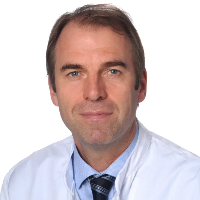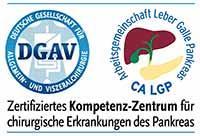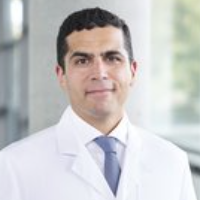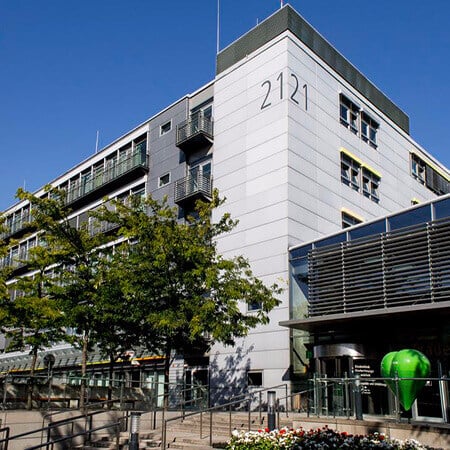Treatment of Stomach Cancer with CRS and HIPEC - hyperthermic intraperitoneal chemotherapy
Treatment prices are regulated by national law of the corresponding countries, but can also include additional hospital coefficients. In order to receive the individual cost calculation, please send us the request and medical records.
Stomach Cancer Treatment
- Stomach (gastric) cancer
- Diagnosis and conservative treatment with 1 course of chemotherapy
- Surgical partial resection of the stomach
- Surgical complete resection of the stomach and further plasty of intestinal tissue
- Embolization or chemoembolization
- Therapy with Lutetium-177-DOTATATE (Lu-177)
- Chemotherapy

Department of General, Abdominal, Transplant, Hepatopancreatobiliary, Colorectal, Endocrine, Bariatric Surgery and Hernia Surgery
The Department of General, Abdominal, Transplant, Hepatopancreatobiliary, Colorectal, Endocrine, Bariatric Surgery and Hernia Surgery provides the full range of services in the areas of its specialization and holds a leading position at the national and international levels in terms of the number of surgical interventions performed and their success. Of particular interest are operations for treating diseases of the bowel, stomach, esophagus, pancreas, liver, gallbladder, and bile ducts, and endocrine glands. The department's doctors have excellent skills in the surgical treatment of cancer, surgery for liver, kidney, pancreas, and small intestine transplants, and operations for morbid obesity. The department's operating rooms are the pride of the medical facility, since they have all the necessary technical options for performing operations with the da Vinci surgical system, image-guided interventions, and endoscopic surgical procedures, which are characterized by minimal trauma rates.







Department of General and Abdominal Surgery, Hepatopancreatobiliary Surgery, Colorectal Surgery, Endocrine Surgery, Hernia Surgery and Bariatric Surgery
The Department of General and Abdominal Surgery, Hepatopancreatobiliary Surgery, Colorectal Surgery, Endocrine Surgery, Hernia Surgery and Bariatric Surgery offers the full range of effective surgical treatments in accordance with modern medical standards. Operations of varying complexity are performed on the stomach, colon, pancreas, liver, gallbladder, bile ducts, rectum, thyroid gland, and parathyroid glands in the department's operating rooms every day. The department's primary focus is the surgical treatment of malignant gastrointestinal tumors. The medical facility is certified in this area by the German Cancer Society (DKG). The team of endocrine surgeons specializes in the treatment of diseases of the thyroid gland, parathyroid glands, and adrenal glands. Patients with morbid obesity are also successfully operated on here. In their work, the department’s specialists primarily use minimally invasive surgical techniques, which virtually eliminate trauma to healthy tissue during the intervention. The department's operating suite is equipped with an innovative da Vinci Surgical System, which allows the doctors to perform sparing and high-precision surgical interventions. The specialists of the medical facility strictly adhere to hygiene and safety standards and create the most comfortable conditions for each patient during their hospital stays.







Department of Abdominal and Colorectal Surgery, Hepatobiliary Surgery, Hernia Surgery, Bariatric Surgery, Endocrine Surgery, Thoracic and Vascular Surgery
The Department of Abdominal and Colorectal Surgery, Hepatobiliary Surgery, Hernia Surgery, Bariatric Surgery, Endocrine Surgery, Thoracic and Vascular Surgery offers the full range of services in these medical fields. It provides surgical treatment of diseases of the gastrointestinal tract, thyroid and parathyroid glands, thoracic organs, vascular system, rectum, anus and colon. In addition, the department performs bariatric interventions for the treatment of morbid obesity. A special focus is made on the treatment of gastrointestinal cancer. Minimally invasive surgical techniques are always preferred, if clinically indicated. The team of the department's surgeons has 8 progressive operating rooms equipped with everything necessary for successful treatment. The department also has the da Vinci Xi surgical system for high-precision minimally invasive robot-assisted interventions. The patient's health is in the safe hands of the best German surgeons who have gone through a rigorous selection and have vast clinical experience.






Stomach cancer is a malignant tumor that occurs in the stomach tissues. Most tumors are formed from the inner layer (stomach lining), which normally produces mucus and gastric juice. These tumors are called adenocarcinomas, and they account for about 90% of all gastric malignancies.
Content
- Stomach cancer overview
- Causes
- Symptoms
- Diagnostics
- Treatment
- The cost of treatment abroad
- How can I undergo CRS and HIPEC treatment abroad?
CRS (cytoreductive surgery) is the first stage of cancer treatment, which involves removing the primary tumor and metastases. HIPEC (hyperthermic intraperitoneal chemotherapy) is rinsing the abdomen with a concentrated solution of chemotherapeutic agents, which is an effective type of intraoperative chemotherapy.
CRS and HIPEC are performed when stomach cancer spreads to the peritoneum (peritoneal carcinomatosis).
Surgeons remove the stomach tumor and any visible metastatic sites. After revision of the abdomen, a heated solution of chemopreventive drugs is placed there for 60-90 minutes.
It is a lower risk of recurrence or disease progression because microscopic metastases are destroyed during HIPEC. Also, HIPEC is easier to tolerate compared to systemic high-dose chemotherapy.
Yes, this is possible after reviewing your medical records and receiving an invitation from the host clinic.
The University Hospital of Ludwig Maximilian University of Munich, Charite University Hospital Berlin, and University Hospital Ulm specialize in CRS and HIPEC.
The cost of treatment ranges from 52 to 92,000 euros. It is influenced by the level of the clinic, age and general condition of the patient, involvement of various organs in the malignant process. On the Booking Health website you will find a list of clinics with current treatment prices.
Stomach cancer overview
Stomach cancer can occur in various parts of the organ – in part of the junction of the esophagus and stomach, in the fundus of the stomach, in its body, and in its outlet. Depending on the location of the tumor, different symptoms occur.
A tumor in the stomach can interfere with digestion, i.e. prevent food from passing into the lower parts of the digestive tract. A cancerous tumor growing into the wall of the stomach can spread to other organs – to grow into the colon and pancreas. When a tumor is located near the esophagus, it can disrupt the passage of food into the stomach. As a result of all this, weight loss occurs followed by physical exhaustion. The tumor can spread through the lymphatic and blood vessels to other organs (liver, lungs, brain, bones, etc.).
Causes
The leading oncologists around the world are looking for the answer to the question of what causes stomach cancer. The reliable causes of malignant neoplasms of the stomach development have not been identified yet. However, to date, the conditions that are connected with the development of cancer cells in the gastric mucosa are well studied.
As with other malignant neoplasms, there is no one specific cause or predisposing medical factor that leads to the development of stomach cancer.
Nutrition is of great importance. Excessive consumption of starchy foods, poor with fresh vegetables and fruits diet, a lack of animal protein and an excess of animal fats contribute to the development of the disease. A negative role is played by alcohol abuse, smoking, irregular eating, improper chewing of food.
Undoubtedly, the presence of chronic stomach diseases plays an important role. With the chronic inflammatory process in the gastric mucosa (chronic gastritis), in the presence of gastroduodenal reflux, when the contents of the duodenum and bile are thrown back into the stomach, the background for the growth of malignant tumors is created. Often polyps transform into stomach cancer. Therefore, timely treatment of these diseases is of high importance in the prevention of stomach cancer.
Symptoms
Stomach cancer has no significant symptoms at its early stages. Signs of stomach cancer may be mistaken for other diseases, such as gastritis. Usually an exacerbation of gastritis leads few people to a doctor’s office. Unpleasant sensations are removed with available medicines and patients hope that the health condition will improve. If the patient notices that he is getting tired quickly, has lost weight, and is constantly experiencing discomfort in the stomach, the patient should consult an oncologist.
The manifestations of advanced stomach cancer depend on the location of the tumor. If it is located in the upper section, where the esophagus enters the stomach, then dysphagia (difficulty swallowing) appears. If the tumor is located in the lower part of the stomach, vomiting with the food that has just been eaten can occur. Also, severe heartburn and abdominal pain that does not go away become constant.
Even if it seems that "it hurts slightly", or "you have to be patient, and it will go away", do not take risks. If you experience the following symptoms, immediately consult a doctor:
- Fatigue
- Severe unintentional weight loss
- Constant discomfort in the stomach and abdomen
- Difficulty swallowing food
- Constant abdominal pain
- Frequent vomiting
- Constant severe heartburn
Diagnostics
A patient with suspected stomach cancer should undergo diagnostic tests, both laboratory and instrumental ones.
The EGD is an endoscopic procedure that is usually prescribed for the diagnosis of gastric oncology. To examine the insides of the organ, the doctor uses a flexible tube with a high-resolution video camera. The video is displayed on the screen in real-time. If during the examination the doctor sees pathological changes in the walls of the stomach, then he takes samples of suspicious tissues for further laboratory analysis.
In addition to the endoscopic examination, radiography with a contrast agent, laparoscopic diagnostics, and various types of tomography are used to confirm the diagnosis. Computed tomography and MRI for stomach cancer allow specialists to receive a comprehensive picture of the disease development and to detect metastases. During positron emission computed tomography (PET CT) the doctor receives information about cancer cells at the molecular level.
Based on the research results obtained, the team of the oncologists elaborates the further tactics of treating the patient.
Treatment
The main and practically the only method of radical treatment of stomach cancer is surgery. However, despite the improvement of surgical techniques, the prognosis of surgery in patients with advanced stomach cancer remains unsatisfactory. As shown by the multivariate analysis in surgical oncology among patients operated on for stomach cancer, independent risk factors for cancer recurrence are an undifferentiated tumor type and affection of the serous membrane of the stomach that is inefficiently treated with surgery.
In the last 15 years, interest in the effectiveness of intraperitoneal administration of chemotherapy drugs for stomach cancer treatment has increased. As a result, the use of hyperthermic intraperitoneal chemotherapy HIPEC has become widespread.
Hyperthermic intraperitoneal chemotherapy (HIPEC) aims to affect macro- and microscopic metastases, as well as free tumor cells in the peritoneal fluid. Hyperthermic intraperitoneal chemotherapy (HIPEC) is indicated not only for palliative surgery procedures, but also for all cases of detection of tumor cells inside the abdominal cavity. A number of specialists in surgical oncology expand the indications, considering it suitable for the treatment of stomach cancer with affection of the serous membrane of the stomach.
The HIPEC procedure can be divided into intraoperative and postoperative one. Hyperthermic intraperitoneal chemotherapy (HIPEC) was initially used in the form of a single injection of a chemotherapy drug into the abdominal cavity at the final stage of the surgery. Then intraperitoneal administration of chemotherapy drugs began to be used in the postoperative period, in the form of multi-day courses. Now, many specialists in surgical oncology consider the administration of drugs during surgery in combination with hyperthermia the most effective method of stomach cancer treatment. For a longer and more uniform flow of chemotherapy drugs into the abdominal cavity, special anticancer drugs have been created for HIPEC.
Currently, HIPEC is rarely performed with a single drug. The advantage of polychemotherapy is confirmed by different studies in surgical oncology. Patients who were operated for stomach cancer with further administration of the heated chemotherapy drugs have shown the best survival rates.
In surgical oncology, some doctors practice the combination of HIPEC and systemic chemotherapy for stomach cancer treatment. Among patients who had metastatic lesions of the peritoneum, a significant improvement in survival was noted in the case of combining HIPEC and systemic chemotherapy.
A surgical oncology practice indicates low toxicity of HIPEC along with the possibility of obtaining a positive effect of treatment of stomach cancer patients with its help. Some studies show the relatively long survival of stomach cancer patients who were treated with HIPEC.
Where can I undergo CRS and HIPEC treatment abroad?
Health tourism is becoming more and more popular these days, as medicine abroad often ensures a much better quality of stomach cancer treatment.
The following hospitals show the best success rates in stomach cancer treatment and other cancer treatments using CRS and HIPEC:
- University Hospital of Ludwig Maximilian University of Munich, Germany
- Charite University Hospital Berlin, Germany
- University Hospital Ulm, Germany
- Tel Aviv Sourasky Medical Center, Israel
- University Hospital Carl Gustav Carus Dresden, Germany
You can find more information about the hospitals and services that they provide on the Booking Health website.
The cost of treatment abroad
The prices in hospitals listed on the Booking Health website are relatively low. With Booking Health, you can undergo cancer treatment with CRS and HIPEC at an affordable price.
The cost of HIPEC ranges from €52.179 to €92.327 and depends on the type of cancer, the extent to which it has spread and the level of the hospital.
You might want to consider the cost of possible additional procedures and follow-up care. Therefore, the ultimate cost of treatment may differ from the initial price.
To make sure that the overall cost of treatment is suitable for you, contact us by leaving the request on the Booking Health website.
How can I undergo CRS and HIPEC treatment abroad?
It is not easy to self-organize any treatment abroad. It requires certain knowledge and expertise. Thus, it is safer, easier, and less stressful to use the services of a medical tourism agency.
As the largest and most transparent medical tourism agency in the world, Booking Health has up-to-date information about stomach cancer treatment and other cancer treatments using CRS and HIPEC in the best hospitals. We will help you select the right clinic taking into account your wishes for treatment.
We want to help you and take on all the troubles. You can be free of unnecessary stress, while Booking Health takes care of all organizational issues regarding the treatment. Our services are aimed at undergoing stomach cancer treatment with cytoreductive surgery and HIPEC safely and successfully.
Medical tourism can be easy! All you need to do is to leave a request on the Booking Health website, and our manager will contact you shortly.
Authors:
The article was edited by medical experts, board-certified doctors Dr. Vadim Zhiliuk and Dr. Nadezhda Ivanisova. For the treatment of the conditions referred to in the article, you must consult a doctor; the information in the article is not intended for self-medication!
Sources:

